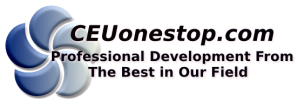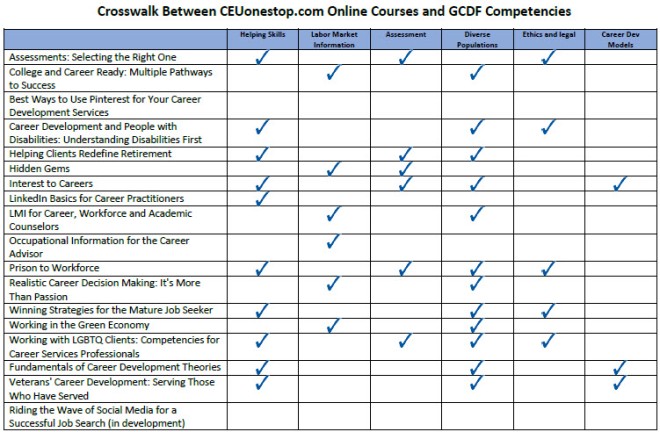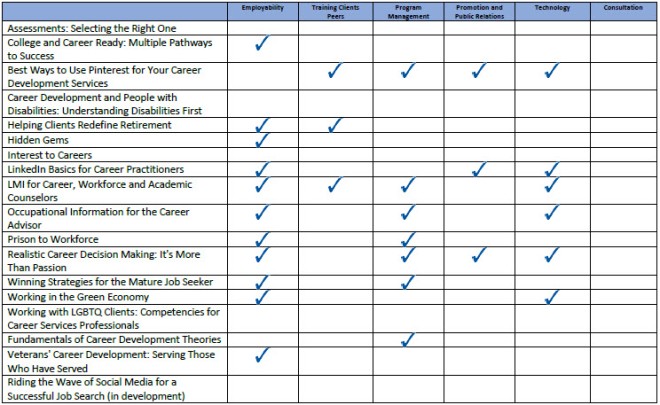Deciphering the CEU – The Continuing Education Unit
by Janet Wall, Founder, Career Planning Academy
 Abstract: Many, if not most, credentials and certifications in the career development field require continuing education to earn or maintain the credential. Continuing education is typically documented by the completion of training measured in CEU clock hours. This article explains the sometimes confusing definition and use of CEUs in our field.
Abstract: Many, if not most, credentials and certifications in the career development field require continuing education to earn or maintain the credential. Continuing education is typically documented by the completion of training measured in CEU clock hours. This article explains the sometimes confusing definition and use of CEUs in our field.
Continuing education is important in the field of career development so that students and clients can be served by professionals who have the latest knowledge, skills, and competencies. Various professional associations require its members who hold certifications or credentials to participate in professional development activities in order to maintain currency in the field, and to document the successful completion of or participation in the training. Despite the widespread use of CEUs, there remains a fair amount of confusion about them, what they mean, how they are calculated, and how they are used. This article attempts to add some clarity to the situation.
What is a CEU? CEU or Continuing Education Unit was defined in 1970 by the US Department of Education and the International Association for Continuing Education and Training (IACET). These groups studied non credit continuing education activities with an attempt at
- Standardizing the definition of a CEU as a measurement of continuing education and training (CE/T)
- Supporting the diversity of providers, activities, and purposes in adult education without sacrificing quality.
The general definition of a CEU according to IACET is 10 contact hours of “participation in an organized CE/T experience, delivered under responsible sponsorship, capable direction, and qualified instruction.” Most career development related organizations use this definition for their certifications and credentials. Organizations have differing requirements for the numbers of CEUs or clock hours for their various credentials.
How are CEUs Used? Some organizations use the CEU to initially obtain the credential. An example of this is the National Career Development Association Credentialing Commission which requires applicants for its credentials to support the application with documented professional development related to career development concepts. The Commission accepts clock hours from National Board for Certified Counselors (NBCC) approved continuing education providers, such as CEUonestop.com as well as that of its own and affiliated state organizations.
Another use of CEU clock hours is to maintain a credential or to recertify. For example, the Global Career Development Facilitator Certification requires 75 clock hours of continuing education every 5 years to maintain the certification. The Commission of Rehabilitation Counselor Certification (CRCC) for the Certified Rehabilitation Counselor (CRC) requires 100 clock hours every 5 years.
The chart gives an overview of the various career development related certifications and credentials and how CEUs are used.
Clock Hour Certification/Recertification Summary Chart
Organization |
Certification or Credential |
Clock Hours Used to Obtain Credential? |
Clock Hours Used to Maintain or Renew Credential? |
Center for Credentialing in Education (CCE) |
Global Career Development Facilitator (GCDF) |
No |
75 documented clock hours every 5 years |
|
|
Board Certified Coach (BCC) |
No |
70 documented clock hours every 5 years; 10 in your specialty area |
|
|
Distance Certified Coach (DCC) |
No |
20 documented clock hours every 5 years |
National Board for Certified Counselors (NBCC) |
National Certified Counselor (NCC) |
No |
100 documented clock hours every 5 years |
|
|
National Certified School Counselor (NCSC) |
No |
100 documented clock hours every 5 years |
National Association of Workforce Development Professionals (NAWDP) |
Certified Workforce Development Professional (CWDP)Specialized Endorsements in Job Seeker Service, Business & Employer Services, Management Services or Youth Services |
NoNo |
60 documented clock hours every 3 years20 clock hours related to the endorsement area’s specialized competencies every 3 years |
Commission of Rehabilitation Counselor Certification (CRCC) |
Certified Rehabilitation Counselor (CRC) and Canadian Certified Rehabilitation Counselor (CCRC) |
No |
100 documented clock hours every 5 years |
|
|
Certified Vocational Evaluators (CVE) |
No |
80 documented clock hours every 5 years |
|
|
Certified Work Adjustment Specialists (CWA) |
No |
80 documented clock hours every 5 years |
|
|
Certified Career Assessment Associate (CCAA) |
No |
80 documented clock hours every 5 years |
International Association for Educational and Vocational Guidance (IAEVG) |
Educational and Vocational Guidance Practitioner (EVGP) |
Yes, as proof of competency |
30 clock hours every 3 years |
National Career Development Association Credentialing Commission (NCDA-CC) |
Certified Career Services Provider™ (CCSP) |
Yes, as proof of competency |
30 documented clock hours every 3 years of NBCC, NCDA, or State CDA training |
|
|
Certified Career Counselor ™ (CCC) |
Yes, as proof of competency |
30 documented clock hours every 3 years of NBCC, NCDA, or State CDA training |
|
|
Certified Master of Career Services™ (CMCS) |
Yes, as proof of competency |
30 documented clock hours every 3 years of NBCC, NCDA, or State CDA training |
|
|
Certified Career Counselor Educator™ (CCCE) |
Yes, as proof of competency |
30 documented clock hours every 3 years of NBCC, NCDA, or State CDA training |
|
|
Certified Clinical Supervisor of Career Counseling™ (CCSCC) |
Yes, as proof of competency |
30 documented clock hours every 3 years of NBCC, NCDA, or State CDA training |
|
|
Certified School Career Development Advisor (CSCDA) |
Yes, as proof of competency |
30 documented clock hours every 3 years of NBCC, NCDA, or State CDA training |
Career Directors International (CDI) |
Master Career Director Credential (MCDC) |
36 hours of documented continuing education |
36 CEUs (36 hours of documented continuing education) every 3 years |
Career Thought Leader Consortium (CTL) |
Credentialed Career Manager (CCM). |
Yes, as proof of competency |
30 CEUs (30 documented clock hours) every 2 years |
State Counseling License |
Licensed Professional Counselor (LPC) (name varies) |
No |
Check state requirements. |
Summary: It is the responsibility of the certification or credential holder and/or applicant to understand the role CEUs and CEU clock hours play in the career development industry, and to know the requirements and standards of the organization sponsoring the certification. This article was written to help career development professionals sort out the various requirements and expectations.






